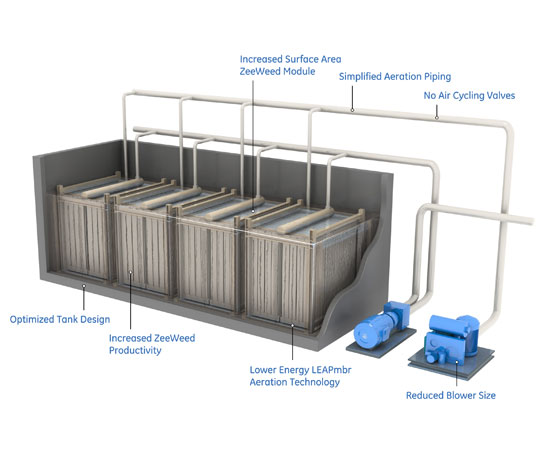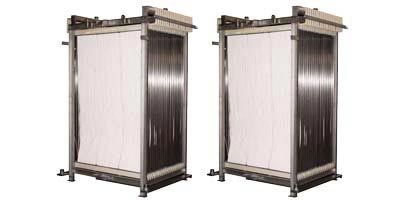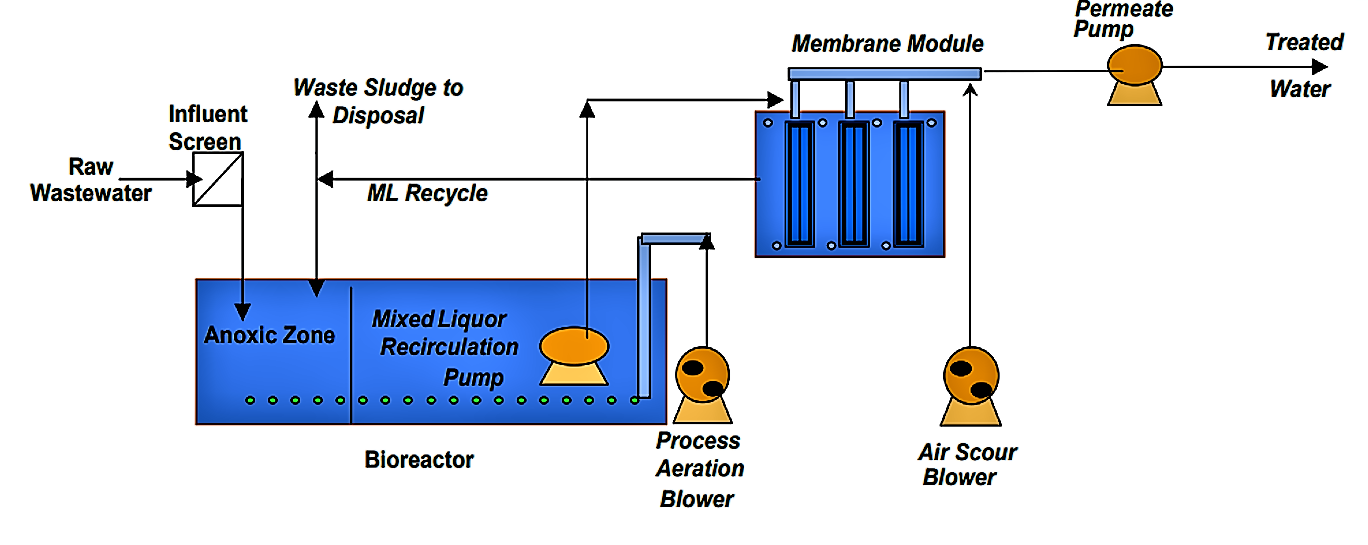Exploring the Benefits of Membrane Bioreactor in Municipal Wastewater Plants
Exploring the Benefits of Membrane Bioreactor in Municipal Wastewater Plants
Blog Article
Just How Membrane Layer Bioreactors Are Transforming Water Filtration Solutions
The introduction of membrane layer bioreactors (MBRs) stands for a substantial advancement in the field of water purification, combining organic treatment procedures with cutting-edge membrane layer filtration innovations. As international water shortage heightens, the role of MBRs in facilitating potable water reuse and sustainable water administration becomes progressively critical.
Overview of Membrane Layer Bioreactors
Membrane bioreactors (MBRs) represent a significant improvement in water filtration innovation, as they integrate organic therapy procedures with membrane layer purification. This combination enhances the performance of wastewater treatment by using microbes to weaken natural toxins while at the same time utilizing semi-permeable membranes to different treated water from put on hold virus and solids.
The MBR system typically is composed of an organic activator where the microbial population metabolizes impurities, complied with by a membrane filtering system that preserves biomass and allows only clean water to pass through. This dual capability results in greater effluent top quality contrasted to conventional therapy methods. MBRs can be operated in both set and continual flow settings, supplying versatility in style and application.
They also allow the healing of water for reuse, hence adding to water sustainability initiatives. In general, MBRs are at the forefront of improving water treatment performance and top quality, showcasing the potential for ingenious solutions in ecological administration.
Benefits of MBR Innovation
The integration of biological therapy with membrane layer filtering supplies many benefits for water purification procedures. Among the main advantages of Membrane layer Bioreactor (MBR) modern technology is its capacity to successfully remove both organic and not natural impurities, bring about high-grade effluent. The membranes serve as a physical obstacle, stopping suspended solids and virus from travelling through, which boosts the overall safety and security and reliability of cured water.
In addition, MBR systems need a smaller sized impact compared to traditional therapy approaches, permitting much more efficient space utilization. This portable style is particularly helpful in urban setups where land is limited. MBRs additionally show operational flexibility, accommodating varying influent high qualities and flow rates without significant efficiency destruction.
Furthermore, the process provides boosted nutrient elimination capabilities, particularly for nitrogen and phosphorus, which are important for avoiding eutrophication in getting waters. The decreased sludge manufacturing associated with MBR technology additionally converts to lower disposal expenses, making it an economical solution over time - Membrane Bioreactor. Overall, the benefits of MBR innovation position it as a leading choice for sustainable and cutting-edge water purification systems, attending to both ecological and economic problems
Applications in Water Filtration
Applications of Membrane Layer Bioreactor (MBR) innovation in water filtration are diverse and impactful, attending to various therapy requires across multiple sectors. MBRs effectively combine biological treatment procedures with membrane layer purification, making them optimal for municipal wastewater therapy, commercial effluent administration, and even potable water reuse campaigns.
In local setups, MBRs are progressively utilized to improve the high quality of dealt with wastewater, enabling compliance with rigid discharge policies and facilitating the recycling of water for watering and non-potable usages. Their portable layout additionally makes them suitable for metropolitan atmospheres where room is restricted.
Industrially, MBR innovation is made use of to treat process water and wastewater, especially in fields such as food and drink, pharmaceuticals, and textiles. By effectively removing contaminants and suspended solids, MBRs assist sectors minimize environmental impacts while recovering important sources from wastewater streams.
In Addition, MBRs are gaining traction in decentralized water therapy applications, where small systems can be deployed in remote locations or creating regions. This flexibility makes it possible for areas to accomplish lasting water monitoring remedies, enhancing accessibility to tidy water while reducing reliance on typical treatment techniques.
Study and Success Stories

In one more example, a fabric manufacturing center in Bangladesh embraced MBR technology to resolve its wastewater challenges. The system lowered chemical oxygen demand (COD) degrees from 1,200 mg/L to less than 100 mg/L, hence satisfying regulatory criteria and considerably minimizing ecological Extra resources impact.
The University of Cape Community's MBR setup has actually shown reliable in treating greywater for non-potable reuse on university. This job not just conserves safe and clean water but likewise functions as an academic version for sustainable techniques.
Furthermore, a fish and shellfish handling plant in Norway utilized MBR modern technology to treat effluents having high levels of raw material, achieving over 90% contaminant elimination. These case research studies emphasize MBR technology's adaptability and its vital function in improving water top quality across diverse applications.
Future of Water Therapy Solutions
As international water scarcity and pollution difficulties escalate, innovative water treatment options are coming to be increasingly important to make sure lasting accessibility to tidy water. The future of water treatment depends on the integration of sophisticated innovations that boost the effectiveness and effectiveness of purification processes. Membrane bioreactors (MBRs) are at the leading edge of this advancement, incorporating organic therapy with membrane layer purification to generate high-quality effluent suitable for different applications.

Arising trends such as resource healing from wastewater, consisting of nutrients and power, will even more transform treatment centers into green hubs. Advancements in nanotechnology and membrane materials assure enhanced performance and longevity of filtration systems.

Conclusion
To conclude, membrane bioreactors represent a substantial development in water purification modern technologies, efficiently combining organic treatment with innovative membrane layer purification. The many benefits, including enhanced effluent quality and lowered spatial demands, make MBRs specifically appropriate for city applications. Their function in safe and clean water reuse and sustainable water monitoring highlights their value in addressing international water shortage difficulties. Proceeded research and advancement will certainly additionally enhance the effectiveness and adoption of MBR modern technology, making certain a resistant future for water therapy options.
The emergence of membrane bioreactors (MBRs) represents a substantial advancement in the field of water purification, merging biological therapy procedures with sophisticated membrane filtration innovations. As worldwide water shortage intensifies, the role of MBRs in promoting potable water reuse and sustainable water management becomes increasingly vital. They likewise make it possible for the recuperation of water for reuse, hence adding to water sustainability initiatives.As global water scarcity and pollution challenges magnify, innovative water therapy remedies are coming Web Site to be significantly important to make sure sustainable access to clean water. Their duty in safe and clean water reuse and lasting water administration highlights their significance in dealing with global water shortage challenges.
Report this page